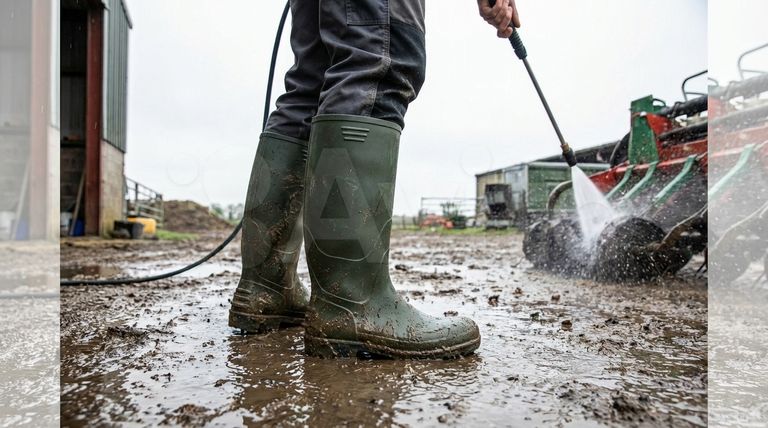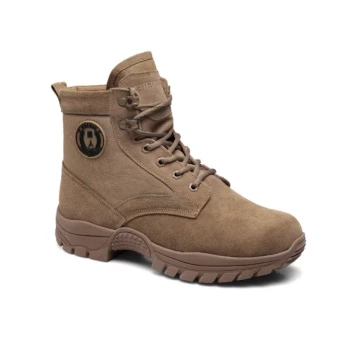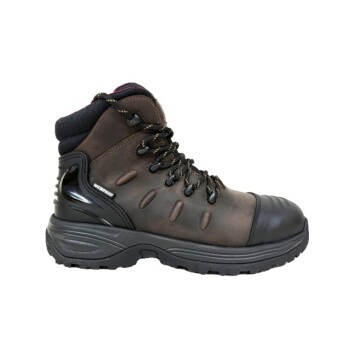In short, PVC work boots are a type of safety footwear made almost entirely from Polyvinyl Chloride, a synthetic plastic. They are constructed through a molding process that creates a seamless, one-piece boot, making them inherently waterproof and highly resistant to many chemicals.
The central takeaway is that PVC work boots offer an exceptional combination of waterproofing and affordability. However, this comes at the cost of reduced long-term durability and breathability when compared to boots made from rubber or leather.

What Defines a PVC Work Boot?
To understand if a PVC boot is right for your needs, you must first understand its core material and construction. Unlike traditional boots stitched together from multiple pieces, a PVC boot is fundamentally different.
The Core Material: Polyvinyl Chloride
Polyvinyl Chloride (PVC) is a synthetic plastic polymer. In boot manufacturing, it is heated until malleable and then injection-molded into the shape of a boot.
This process creates a single, seamless shell with no stitches or welt joints that could potentially leak. This unified construction is the source of its primary strengths and weaknesses.
Unmatched Waterproofing
Because there are no seams, PVC boots are 100% waterproof right out of the box. This makes them an excellent choice for work environments where feet are constantly exposed to water, mud, or other liquids.
Lightweight Construction
Compared to traditional, heavy-duty rubber boots, PVC boots are often significantly lighter. This can reduce foot fatigue over a long workday, making them a more comfortable option for constant walking.
Where PVC Boots Excel (And Where They Don't)
The unique properties of PVC make these boots highly specialized. They are an outstanding choice for certain jobs but a poor fit for others.
Ideal for Wet Environments
PVC boots are perfectly suited for industries like agriculture, food processing, sanitation, and commercial fishing. Their chemical resistance and easy-to-clean surface are major advantages in these settings.
A Cost-Effective Solution
One of the biggest advantages of PVC is its low cost. These boots are typically much less expensive than high-quality rubber or leather alternatives, making them a practical choice for large crews or for workers who go through boots quickly.
Limitations in Heavy-Duty Scenarios
While durable, PVC does not have the same abrasion and puncture resistance as premium rubber or thick leather. For heavy construction sites with sharp debris and constant friction, a different material may be a more protective choice.
Understanding the Trade-offs
Choosing any work boot involves balancing competing factors. PVC is no exception, and being aware of the trade-offs is critical for making an informed decision.
Durability vs. Cost
The primary trade-off is longevity. While PVC boots provide excellent value, the material can become brittle over time, especially with exposure to UV light and extreme temperatures. They may crack or deteriorate faster than more expensive rubber boots.
Flexibility and Comfort
PVC tends to be more rigid than natural rubber. This can be a drawback in very cold weather, where the material can stiffen considerably, impacting both comfort and traction.
Breathability is Non-Existent
The same seamless, waterproof construction that keeps water out also traps sweat in. PVC boots do not breathe, which can lead to discomfort and moisture buildup inside the boot during long shifts in warm conditions.
Making the Right Choice for Your Goal
Selecting the correct boot material depends entirely on the demands of your work environment.
- If your primary focus is maximum waterproofing on a budget: PVC work boots are your most practical and cost-effective solution.
- If your primary focus is durability against harsh chemicals and extreme cold: High-grade rubber boots often provide better long-term performance.
- If your primary focus is protection from impact and puncture in a rugged, dry environment: A steel-toed leather boot is the superior choice for its durability and support.
Understanding these core material differences is the key to selecting footwear that truly protects and performs for your specific task.
Summary Table:
| Aspect | PVC Work Boots | Ideal Use Case |
|---|---|---|
| Waterproofing | Excellent (Seamless) | Constantly wet environments |
| Chemical Resistance | High | Food processing, sanitation |
| Cost | Very Affordable | Large crews, budget-conscious buyers |
| Durability | Good, but can become brittle | Moderate-duty applications |
| Breathability | Low | Shorter shifts or cooler conditions |
Need Durable, Waterproof Work Boots for Your Team?
As a large-scale manufacturer, 3515 produces a comprehensive range of industrial footwear, including specialized PVC work boots perfect for distributors, brand owners, and bulk clients. We ensure high-volume production without compromising on quality or value.
Let us help you equip your workforce with the right protection.
Contact our team today to discuss your specific needs and get a competitive quote for your next order.
Visual Guide

Related Products
- Premium High-Cut Waterproof Safety Boots Manufacturing & Wholesale Solutions
- Heavy-Duty Waterproof Nubuck Safety Boots Safety Shoes for Bulk Supply
- High Performance Fire-Retardant Waterproof Safety Boots
- Premium Grain Leather Safety Boots for Bulk Supply
- Premium Wholesale Wheat Nubuck Safety Boot with Rapid Lacing System
People Also Ask
- What are the key benefits of wearing motorcycle boots? Essential Safety & Comfort for Riders
- What are winterized work boots and their features? Essential Footwear for Cold, Hazardous Job Sites
- What are the characteristics of synthetic/leather boots? Modern Performance Meets Lightweight Durability
- What cowboy boots are best for work? Find the Right Work-Ready Cowboy Boot for Your Job
- Why is comfort important in work shoes? Boost Health, Safety, and Productivity
- How does the manufacturing process of PVC work boots differ from other types? Seamless, Waterproof Design
- Why is ankle support important for improving physical performance? Boost Stability & Power
- How long can a well-maintained pair of leather boots last? Achieve Decades of Wear with Proper Care



















